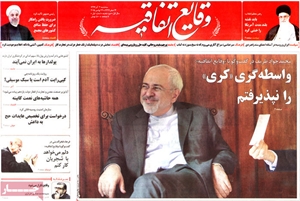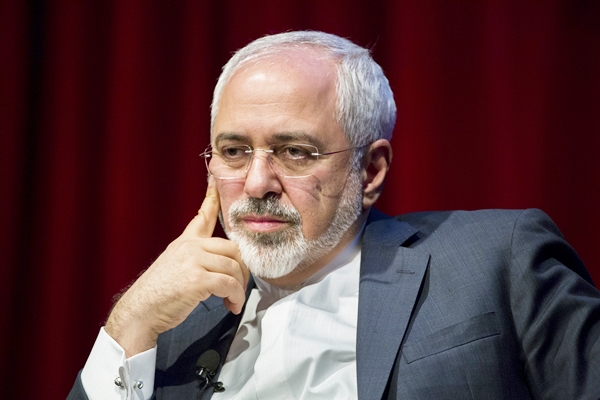The foreign minister has said that Iran and Saudi Arabia do not need mediation to handle their ties, reiterating that Iran views the security of Saudi Arabia as its own security.

Q: In recent talks in Vienna over the Syrian crisis, there were plenty of opportunities for Iran and Saudi Arabia to hold talks. Mr. John Kerry repeatedly sought to broker such talks, but you turned it down.
A: We are living in the Middle East region. We need to establish contacts with Muslim nations in this region. Therefore, we have always said that establishment of ties with neighbors based on mutual respect takes top priority in Iran’s foreign policy.
Q: Why didn’t you accept the US mediation between Iran and Saudi Arabia?
A: Because we do not need mediation. In round two of the Vienna talks over Syria, I told Saudi Foreign Minister Mr. Adel al-Jubeir that Tehran views the security of Saudi Arabia as its own.
Q: But the behavior of Saudi officials shows that Riyadh has no trust in Iran. The Saudi support for Israel’s foreign policy reveals their attitude toward Iran. Where do you stand on that?
A: I think the current behavior of Saudi Arabia is short-lived. Saudi officials have become unsettled thanks to sudden developments in Iran-West ties. In other words, they had got accustomed to a fixed situation [in which] they blamed Iran for all their problems and tried to sell the idea that Iran is a barrier to peace and calm in the Middle East. They used to promote [their own] interpretation [of Iran’s role in the region], but they can no longer claim that regional developments, ISIS and the internal issues of Arab states have something to do solely with Iran.
As a matter of fact, Saudi Arabia is struggling to maintain its past position in regional equations. Naturally this struggle comes with some sort of hot-temperedness. We need to understand the Saudi behavior. As a big country, Iran can see that the Saudi hot-temperedness is a sign of its concerns about the shifting political and economic equations in the region.
Let me put it this way: the Saudis are worried that their game plan has changed. What we need to do is to develop an understanding of the behavior of our neighbors and provide them with the opportunity to change. We need to help allay the concerns of Saudi Arabia.
The Saudis need to feel that Iran is not seeking to delete them from regional equations. As I’ve already said the current behavior Saudi Arabia is showing will not stay long, because the realities on the ground will convince Saudi Arabia and its allies to accept the new Iran.
Q: You are talking about must-haves. How will they become a reality?
A: We can change the Saudi attitude through changing our own words and deeds and foiling attempts by those who are seeking to maintain a climate of Iranophobia at any cost.
Q: The problems Iran is grappling with in the Middle East region are not blamed on the less than active performance of our diplomats, are they?
A: No, quite the reverse! Our diplomats are fully active in the region. The involvement of different bodies in the country’s foreign policy – if their general principles are coordinated – does not signify disorderliness or abnormality. All over the world, not one [government] body alone gets involved in the countries’ foreign policy. What the foreign policy needs in order to succeed is a coherent, coordinated framework.
As it was evident in the [discussions over] the Joint Comprehensive Plan of Action (JCPOA), there are differences of opinion in the country, but it does not mean that different institutions adopt different policies on foreign policy.
The general policies Iran is pursuing in the region are: outsiders should not interfere in the crises in the Middle East, and people in crisis-hit countries should decide their own future. In line with its general policies, Iran opposes meddling in the internal affairs of the countries. Iran believes that referendums should be held in Middle Eastern countries so that calm can take hold [in the region].
Q: How do you see the future of Syria?
A: Syria needs a political solution. I think Syria will either work out a political solution based on participation of all Syrian people or teeter on the brink of collapse. I’m concerned that certain regional countries may opt for military options thanks to the stockpiles of military hardware they have at their disposal.
I still hope that they have taken a lesson from the example of Yemen which has caused massacres in the region with no military achievements.
Q: When we look at the images of Vienna-II talks over Syria, we see that you and Mr. Adel al-Jubeir sat away from each other at the table. How come at the negotiating table you were seated away from the Saudi top diplomat? Was it a preplanned move?
A: In diplomatic talks, there are [proper diplomatic] protocols the seating plans which should be observed for diplomats. The seating plan for multi-lateral talks is arranged either in alphabetical order or according to the seniority of the diplomats.
A position of seniority is not of great importance; an individual may have been foreign minister for 20 years and another might have been in office only for two months. The one who’s been on the job for 20 years definitely has seniority over the other.
So is the case with diplomatic missions. If you represent your country at the United Nations for five years, you will be certainly given a better seat. [In Vienna talks] If [Prince] Saud al-Faisal had been the Saudi foreign minister, he would have been given a higher position, for sure, like in the case of Oman whose top diplomat Yusuf bin Alawi had been seated in a higher position.
In that session [Vienna talks over Syria], my seniority was at the seventh or eighth level and Mr. Adel al-Jubeir, who’s served as his country’s top diplomat only for a few months, had been seated at a lower level [than me]. These points should not be highlighted and other diplomats should not be disrespected on this ground.
Q: Some Saudi officials claim that Iran interferes in the internal affairs of Arab nations, saying that Iran should change its behavior so that a solution can be worked out to the Syrian crisis.
A: I think these claims are nothing but sloganeering. Our friends [Saudi authorities] know well that these claims are far from correct. What needs to change is the mentality of the Saudi officials who think the Syrian crisis can be settled through military means.
The sooner they come to this conclusion [that they have to change their mentality], the lesser threat they will pose to themselves and the entire region. A solution which relies on people’s vote will be sustainable. The Syrian crisis needs a diplomatic solution to be defused.
Unfortunately, in the Vienna talks I had a serious concern. I learnt that some of our neighbors had yet to realize that ISIS poses a grave threat to them. They think that ISIS is their leverage for talks or a pawn [in the power struggle]. They have failed to understand that this pawn is in fact a snake with which nobody can play. This snake has set its sights – more than anything else – on Arab nations, especially the Hijaz region. That’s why I think Saudi Arabia should change its attitude, something I think has yet to happen.
